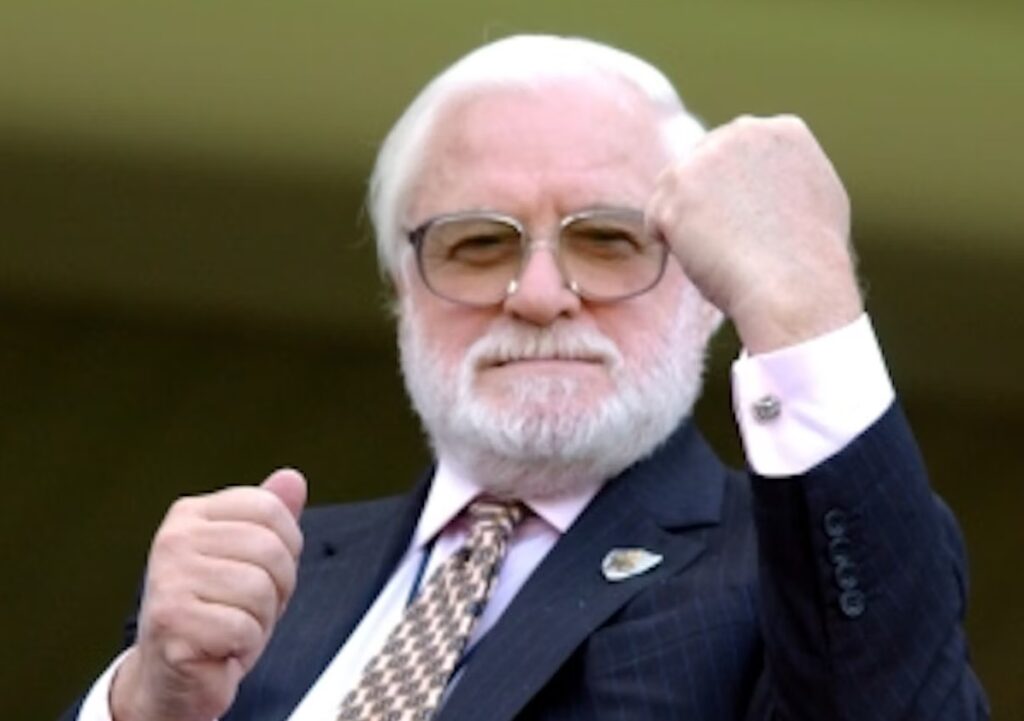Ken Bates: from a London council flat to sunny Monaco, the colourful destiny of English football’s ‘enfant terrible’

The architect of Chelsea’s renaissance before selling the team to Roman Abramovitch, the businessman is enjoying a quiet retirement in the Principality. Relatively quiet, that is, as Ken Bates soon rediscovered the verve he is known for, particularly when expressing his opinion on those who succeeded him at the helm of English football.
Any journalist, football fan or observer of Monegasque life hoping to catch a glimpse of Ken Bates will first head over to the Café de Paris. The terrace of the elegant Belle Époque style building is one of the businessman and Monaco resident’s favourite haunts. Bates has his own table. This is where he likes to give his rare interviews, always with his wife Suzannah in attendance. And indulge in his favourite activity:
Embed from Getty ImagesJournalists, who he almost systematically obliges to foot the (steep) bill for a meal in his company; waiters, who he delights in teasing, then lavishing them with generous tips; and, of course, his successors at the head of English soccer, who get an earful every time the former Chelsea boss opens his mouth. In short, the Café de Paris is his “office”, as Ken Bates likes to say in an interview with the Independent.
In his 93rd year, he has lost none of his legendary chutzpah. Nor his extraordinary ability to have a go at anyone he thinks deserves it. Notoriously gruff and not very approachable, Ken Bates can change completely in the blink of an eye, delivering a plethora of details to his bemused audience about the eventful life that has taken him from London’s working-class suburbs to sunny Monaco, via some of the most iconic British soccer grounds.
Oldham, Wigan, Chelsea, Leeds; Stamford Bridge, Wembley; Kerry Dixon, David Speedie, Pat Nevin, Nigel Spackman, Gianfranco Zola – his favourite player -, Roberto Di Matteo, Marcel Desailly; Matthew Harding, Roman Abramovitch…: English football clubs, stadiums, players, coaches and bosses, all of whom owe a large part of their career, fame or fortune to him.
Embed from Getty ImagesA self-made man who has always lived by his own rules
However, nothing predestined the young Kenneth William Bates to one day rub shoulders with the greats. Born in 1931 in Ealing, a district in the west of the UK capital, the little boy was raised by his grandparents, who lived in a council flat: his mother died shortly after he was born, and his father walked out.
Even the most seasoned interviewers can’t get more information out of Bates on the subject, which is clearly still painful almost a century later. Born with a club foot, the boy underwent almost a dozen operations. But that didn’t stop him running off to the nearest football pitch to play with his pals. Although he had some talent, the young man didn’t have what it takes to become a professional player. No matter. He went into business for himself, making his fortune in haulage, then quarrying, ready-mix concrete and dairy farming.
After some entrepreneurial misadventures in the British Virgin Islands, Ken Bates went back to his first love, football. And never left.
In 1965, the businessman bought Oldham Athletic, which he chaired for five years. In 1980, he bought Wigan Athletic with his partner Freddie Pye and became the club’s vice-president. His personal fortune allowed him to bankroll the neighbouring club of Manchester United, enabling his manager, Larry Lloyd, to recruit some well-known players, such as Eamonn O’Keefe.
Under his leadership, Wigan earned promotion to the English third division in May 1982. Ken Bates was just warming up. That same year he had an intuition that would change his life and the destiny of English football: to buy Chelsea, a club languishing in the Football League’s second division and drowning in debt. It was a stroke of genius.
The architect of Chelsea’s return to the big leagues
1 pound sterling. That’s how much Ken Bates paid for Chelsea Football Club in the early 1980s. At the time, the London club was bankrupt. Its home ground, Stamford Bridge, was practically in ruins. And the players were facing relegation to the third division, a distaster they narrowly avoided on the last day of the 1982-83 season.
Under Bates’ leadership, the club began its metamorphosis – a veritable resurrection. Borrowing heavily, the new boss got out his cheque book and allowed manager John Neal to recruit players such as Kerry Dixon, Pat Nevin, Mickey Thomas, Nigel Spackman, David Speedie and Eddie Niedzwiecki.
The results were quick to follow. The season after the buyout, Chelsea moved up to the Premier League, heady heights from which the club xould descend only once over the following 19 years.
Chelsea was finally getting back to the success it had enjoyed in the 1960s. With Ken Bates at the helm, the club established itself as one of the top teams in the UK, finishing seven times in the top six in the Premier League.
Bates also enabled the club to lift several major trophies: the Cup Winners Cup, the League Cup, the FA Cup – twice – and the UEFA Super Cup (1998). Bates remembers the last one well: “We were European champions and 16 years before we were bankrupt. We couldn’t pay the players’ wages. It hasn’t been a bad journey. (…) That night was particularly pleasant,” he told the Telegraph in 2021.
Embed from Getty ImagesIt’s impossible to talk about Ken Bates’ reign at Chelsea without mentioning the businessman’s tireless efforts to make sure the club could keep Stamford Bridge stadium. A legendary name and Chelsea’s birthplace, its freehold was owned, in the 1980s, by real estate developers.
After a long and fierce battle with them, Bates managed to transfer the entire property to the Chelsea Pitch Owners, an ad hoc structure created with the club’s supporters. Now owners of both the lease and the club’s name, they have the right to veto any move away from the site.
It was a way of giving power to the fans that Ken Bates still stands by decades later, as he told the Daily Mail in 2022: thanks to the major renovation work carried out under his presidency, “Stamford Bridge is probably the most valuable piece of land in London. But it belongs to the club. That’s my legacy.”
A key figure in English football
In 2003, when Bates was Chelsea’s most successful chairman, the businessman sold the club, which he had bought for a symbolic £1, to Russian billionaire Roman Abramovitch, for £140 million. In the process, he pocketed a handsome profit of £17 million.
Bates remained as club chairman until 2004, when he resigned and bought a 50% stake in Leeds United the following year. History seemed to be repeating itself: relegated from the Premier League and in the financial doldrums, the team was on its knees.
Why start off on another adventure like that? Because Leeds, as Ken told his wife, was “ too great a club to go bust.” Too big to fail, so to speak. However, his time at the helm of the club was, once again, eventful: £35 million in debt and in receivership, Leeds was down in the Third Division. Bates wore out a number of coaches, and the supporters even staged demonstrations demanding his resignation. Ken Bates eventually sold the club to an investment fund in 2012.
In his 80s back then, the businessman had already had a full career. As well as his club exploits, English football fans owe him a debt of gratitude for his part in the (chaotic) development of Wembley Stadium and the creation of the Premier League as they know it today. Bates is said to have personally negotiated the English championship broadcasting rights with media tycoon Rupert Murdoch – a deal sealed, by his own admission, “behind the establishment’s back.” Many English fans still have a “bittersweet” image of Ken Bates.
A keen insight into the world of football
A view that he does not seem to share. He says: “99% of the letters and e-mails are supporting us and that’s not bad. That’s as good as Saddam Hussein did and he was fiddling the figures.” Generally speaking, while it seems difficult to get Bates to talk, it seems just as difficult to stop him once the floodgates are open.
Ken has an opinion on everything, and he’s determined to share it. The Americanisation of football? “It’s just an investment to them. You don’t win things any more, you buy them and I think it’s disgraceful. It’s not the game.” The white paper published by British MPs on football governance? “A load of rubbish.” Roman Abramovitch? “He went mad.”. VIPs who ask for free tickets? “The worst scroungers” – even Tony Blair? Yes, “I told him to f*ck off.” We’ve been warned.
It would seem Monte-Carlo’s Mediterranean climate hasn’t mellowed the Londoner’s prickly character. He leaves the sweetness to his wife, Suzannah, who has started writing a biography of her businessman husband, and to his five children.
Embed from Getty ImagesDetermined to make the most of every day he has left in Monaco’s sunny climes, where he has lived since the sale of Chelsea F.C., Ken Bates is perhaps one of the last witnesses to a certain conception of football; a certain era when sport was still more about people than money; a certain style too – whether you like it or not. “I’ve achieved a lot of things,” he says, “I”ve made many enemies but I’ve made a lot of my friends laugh: that’ll be my epitaph.” If he doesn’t outlive us all…











